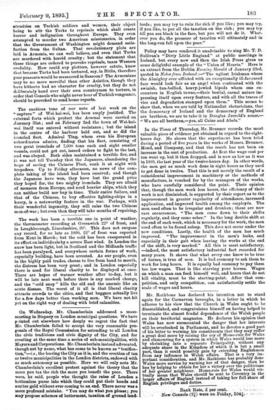In the Times of Thursday, Mr. Brunner records the most
valuable piece of evidence yet obtained in regard to the eight- hours day. He shows that the experiment has been tried during a period of five years in the works of Messrs. Brunner, Mond, and Company, and that the result has not been an increase in the cost of production. At first the wage cost per ton went up, but it then dropped, and is now as low as it was in 1889, the last year of the twelve-hours day. In other words, the men get as much work done in eight hours as they used to get done in twelve. That this is not merely the result of a coincidental improvement in machinery or the methods of manufacture, is vouched for by the managers of the works, who have carefully considered the point. Their opinion that, though the men work less hours, the efficiency of their work is not diminished, is supported by their report as to the improvement in greater regularity of attendance, increased application, and improved health among the employes. The men used often to be irregular and drunken; these are now rare occurrences. "The men come down to their shifts regularly, and they come sober." In the long double shift at the end of each week, which is necessary for the work, the men used often to be found asleep. This does not occur under the new conditions. Lastly, the health of the men has much improved. "The improvement in the men's looks, and especially in their gait when leaving the works at the end of the shift, is very marked." All this is most satisfactory, —indeed, the most satisfactory industrial fact recorded for many years. It shows that what every one knew to be tree of horses, is true of men. It is bad economy to ask them to work for long hours. It is equally bad economy to pay them too low wages. That is like starving your horses. Wages on which a man can feed himself well, and hours that do not kill vitality, must be the starting-point. After that com- petition, and only competition, can satisfactorily settle the scale of wages and hours.






































 Previous page
Previous page